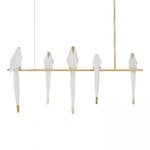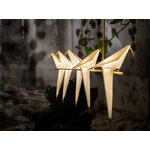Perch Light Branch by Moooi features beautiful origami birds, finished with brass-coloured beaks and tails, gracefully balancing on a thin branch. Touching the luminous birds softly brings them magically to life, as this triggers a gentle swaying motion. The poetic lamp is designed by Umut Yamac.



Perch Light Branch pendant, dimmable
Moooi
Description
Perch Light Branch by Moooi features beautiful origami birds, finished with brass-coloured beaks and tails, gracefully balancing on a thin branch. Touching the luminous birds softly brings them magically to life, as this triggers a gentle swaying motion. The poetic lamp is designed by Umut Yamac.
Product details (17)
- Material
- Steel, aluminium, polypropylene, synthetic paper
- Colour
- Brass, white
- Length
- 112 cm
- Height
- 51 cm
- Light source
- Integrated 15W LED
- Colour temperature
- 3,000 K
- Luminous flux
- 560 lm
- IP rating
- 20
- Voltage
- 180–240 V
- Certifications and labels
- CE marked: tested and approved according to European standards
- Cable length
- 400 cm
- Cable colour
- Black
- Canopy
- Yes, diameter 21 cm
- Ceiling plug
- No
- Dimmable
- Yes
- Adjustable height
- Yes
- Notes
- Includes 3 small and 2 large birds.
- Product ID
Designer
Umut Yamac (b.1980) graduated from the Bartlett School of Architecture, University College London and has run his own design studio since 2011. The London-based designer wants to create products that spark the user’s interest either due to their functionality, playfulness or – in the best scenario – both.
View all productsReviews (0)
Sustainability
The Product Sustainability Framework, our criteria of sustainable design, helps you find the most sustainable products in our selection. Read below which sustainability criteria this product has met.
Working conditions & labour 9/9
-
Equal opportunities for all employees
-
Commitment to UN Global Compact, fair compensation for all employees
-
Corporate responsibility requirements defined and communicated for suppliers
-
Systematic work for improved inclusion and well-being in the workplace
-
Transparent supply chain
-
Suppliers' compliance to a code of conduct ensured
-
Direct suppliers audited and certified
-
Compliance to the UN Guiding Principles on Business and Human Rights ensured in the supply chain
-
Support for community involvement in the supply chain
Eco-friendly production 7/9
-
Fair and resource-wise water-use in production
-
No incineration or landfilling of returned items
-
No use of endangered species as materials
-
No direct environmental emissions or waste (excl. GHGs) from production
-
The sustainability of direct suppliers' production is addressed and monitored
-
Material-efficient and ecological packaging
-
No potentially harmful chemicals used in own production
-
Production and material sourcing that respect biodiversity, animal rights, and natural ecosystems
-
Positive impact on nature’s well-being through operations that regenerate natural ecosystems
Climate impact 3/8
-
Company's direct greenhouse gas emissions identified and commitment to reduction
-
Product's carbon impact identified and commitment to reduction
-
Guidance on energy- and eco-efficient use of the product
-
Contribution to climate initiatives beyond the brand’s direct operations
-
Low-carbon or compensated transportation
-
Carbon footprint of the product calculated and goals set to reduce it
-
100 % renewable energy in own production and operations
-
Carbon neutral or carbon negative product
Sustainable materials 5/6
-
Sustainable and long-lasting material choices
-
No harmful or hazardous substances
-
Responsible raw material sourcing and production
-
Materials suited for circularity: monomaterials, recyclable finishings, renewable or recycled contents etc.
-
Ecological materials: natural, biodegradable, recyclable or recycled contents
-
Outstanding materials in terms of innovativeness, responsibility, sustainability and circularity: local production or sourcing, 100 % recycled content, C2C-certification etc.
Circular design 5/5
-
High aesthetic quality promoting long-term use of the product
-
Technically durable product design and material choices
-
Design for enduring life-long quality
-
Design and support for product maintenance, repair and upgradability
-
Innovative circular design solutions: circular service system, resale platform, remanufacturing, collection of used products, etc.






